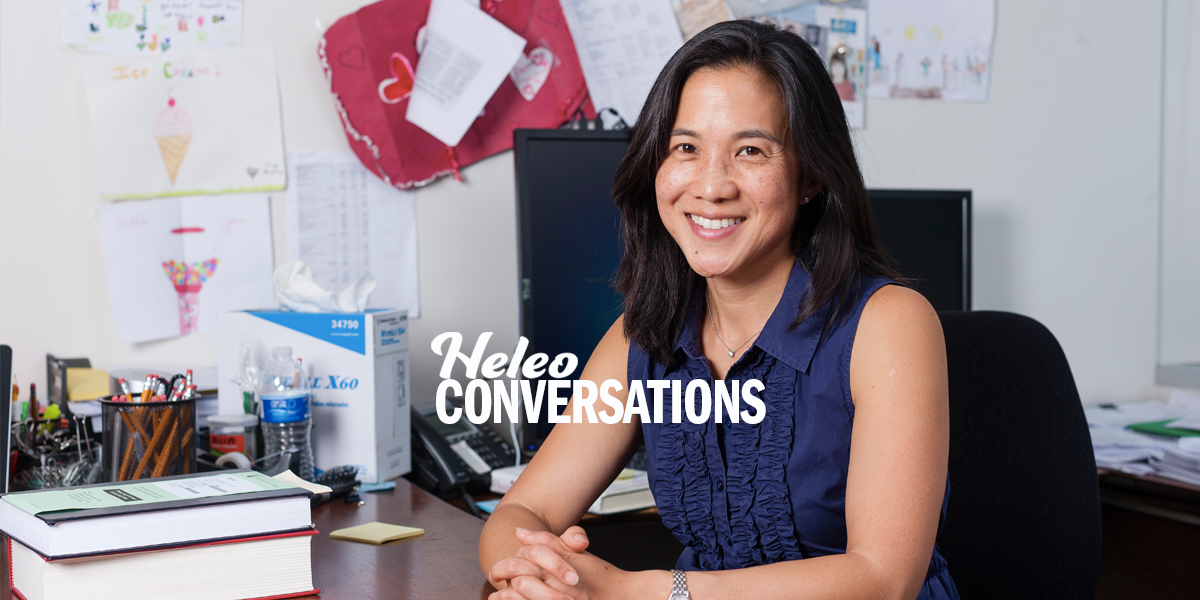In her New York Times bestseller, Grit: The Power of Passion and Perseverance, Angela Duckworth put the concept of “grit” on the cultural map. A psychologist, MacArthur fellow, and the founder and scientific director of the Character Lab, Duckworth has researched and reflected upon this critical trait. She sat down with Heleo’s Editorial Director, Panio Gianopoulos, to discuss the path to mastery, parenting as psychology, and the necessary messiness of success.
Panio Gianopoulos : A common thought about grit is that it’s stubbornness. Someone who grits their teeth and gets through it. Is that how you would define it?
Angela Duckworth: I define grit as a combination of passion and perseverance for really long term goals. Being stubborn is part of grit, but not all of it. To be gritty the way I use the word means that you’re working on something that’s important to you, and which you find enduringly interesting. If you’re just stubborn, but you’re not fascinated by your topic, if you don’t find it meaningful, then I wouldn’t say you’re gritty.
Panio: Grit is interesting because of the balance between mastery and exploration. On the one hand, people are told, find one thing you’re great at and become an expert. Don’t be a jack of all trades. But on the other hand you’re told to explore, because you might not know that thing you’re incredible at yet. How do you balance it?
Angela: There’s a tension, as you say, between mastering one thing and becoming a jack of all trades. Grit is very much about trying to become a master of one trade. But here’s where exploration is important. Very few people I’ve interviewed are blessed with the good fortune of knowing what that one thing will be when they’re young. There are people like [New York Times crossword puzzle editor] Will Shortz who did his first puzzle when he was eight, and by the time he was a teenager knew that he wanted to be a puzzle master for the rest of his life. He’s the exception, not the rule.
Most people that I talk to stumbled around a little bit. They explored, but the exploration had a purpose in that they weren’t content to explore indefinitely. Like dating, you’re dating so that you can get married.
Panio: Also there’s the instance of skills being adaptable. Sports is an obvious example. You start playing football, and then one season you try baseball. The athleticism that you developed in football you can port over to another sport.
Angela: There’s research on kids who explore lots of different sports when they’re young. You can contrast the kid who starts playing hockey and only plays hockey with the kid who played a little hockey, a little basketball, ran track one season. Generally the finding is that kids who sample a lot when they’re young, before they commit to one sport, on average are just as good later on. Secondly, they’re less like likely to burn out. And third, they’re less likely to be injured. That cross training is actually important.
That’s maybe less true of an intellectual pursuit, but the general idea is that early life sampling is a good thing. But if you’re 45, or 65, and you’re still trying to figure out what you like — I find that most people in that situation are not happy with never really becoming good at anything.

Panio: That’s one of the dangers. You sample so much you fritter away your life.
Angela: I was like that. Between 22 and 32, I had a bunch of different career directions. I did a stint in the White House as a speechwriting intern, I ran a summer program for kids, I taught in the classroom thinking that maybe I’d want to be a master teacher when I grew up, maybe run a school. I worked at McKinsey as a management consultant …
Panio: But these are all impressive things. You weren’t hanging out at Dairy Queen.
Angela: They were impressive in a sense. You look at a resume like that, and you think, ooh White House. She went to Oxford. She has a degree in neuroscience. It’s someone you should invite over for a dinner party because you’ll have lots of things to talk about. But you wouldn’t want me to be the person to write your speech after doing one summer in the White House. Frankly, you shouldn’t be doing neuroscience research at the cutting edge when you’ve only spent two years doing it for a master’s degree.
I was really dissatisfied with my own life when I was 32. I thought, what am I doing? I had a craving to really be good at something, to go deeper.
Panio: Is it different now that work has changed, and people don’t have 30 year careers at the same company? Is this a more modern manifestation?
Angela: Sometimes the claim gets bandied about that you’ll have seven careers in your lifetime. But when you talk to experts who really study careers and jobs, it turns out that figure is inconceivable. On average, people might have seven different jobs, seven different employers, but seven different careers? I think we overestimate how technology and a rapidly evolving marketplace are going to change the basic arithmetic of becoming expert at anything. Being a writer, being a psychologist, being a mechanic — if you’re going to be really great, it does take time, and therefore there’s a constraint on how many things you can really be great at.
Panio: Personally, there was a moment when I was in my 20s, and I was doing a bunch of things. I was writing, working in publishing, doing martial arts, playing guitar — and I was dating.
Angela: Which is a lot of effort. If you’re going to do it well.
Panio: [laughs] So I said, one of these things has to go. One of these things I have to do not very well. I picked guitar. I think a lot of people go through that, especially as you get married or have families and you’ve got really limited time. You say, one of these things has to be cut. I can’t master everything.
Angela: I think that’s right. There are people in the world who might not agree with that choice, and they would say that they would rather be okay at a lot of different things. There isn’t anything wrong with that, but it does come at a cost. If you do that knowing that you’re giving up becoming an expert, then that’s your decision to make. I used to want to be really good at cooking. I did actually get pretty good — not chef good, but better than I am now. The reason why my cooking skills have withered is because I don’t have time to cook. How many days do I come home where I just heat up Trader Joe’s meatballs?
Panio: I had the good fortune to be in the audience once when you were giving a speech, in Houston. What really remained with me was a graph that you put up.
Trending: How to Transform Daily Habits into Life-Changing Rituals
Angela: I love graphs but apparently they’re not generally loved.
Panio: We’re a small club, graph-lovers. This graph was about the nonlinear success story. A lot of times we think we can map out success, but in fact, the research shows that’s not how it happens. You don’t say, I’m going to hit this target, and then you just hit it.
Angela: It’s really messy. First of all, the skill curve isn’t a straight line. You improve rapidly at the beginning of a new skill. If you started skiing, between your first and fourth time you would rapidly improve. But between your fourth and your eighth time, you’d get better, but not as much. Between your 104th and your 108th time, yes you get better, but how much better?
A learning curve is a curve, not a line. That tells you that you’re going to have to work through parts that are less dramatic. You have to put in hours and hours of practice, even when you don’t wake up the next day visibly improved. And to your point, there’s also just a total messiness. Detours, bad decisions, off days, off weeks. One MacArthur Fellow that I spoke to, Irving Feldman, I think he’s 96 or something, he said that progress in his own domain, which is poetry, is like a series of leaps from plateau to plateau. But in between those leaps are unpredictably long hours of no visible progress. It’s jagged no matter how you look at it.
When you see excellence, you almost don’t want to see how the person got there. You don’t want to see them stumble. You don’t want their clumsy attempt — you just want to be awed.
Panio: I’ve noticed, right before a leap of ability in any pursuit, there’s always a frustrating moment when I realize how not good I am at it. The perception of increased ability precedes the ability.
Angela: I think about it in terms of four quadrants. You can either have things conscious — you know about them, you can talk about them — or they could be unconscious — you’re just not aware of them. You can be competent at some things, or relatively incompetent. Most people start off with a new skill being unconsciously incompetent. You know so little, you don’t even know that you don’t know what you’re doing. Then, this is what you’re talking about, you know enough to figure out what you’re doing wrong. You become consciously incompetent. “Oh, my writing sucks. I can’t believe that first sentence.” Before you know how to fix that first sentence, you can hear that it’s off. Ira Glass, the founder of “This American Life”, has this great quote about how “You know you’re on your way, when you can hear how horrible what you’re doing is.” Because if you can’t recognize that, you haven’t really gotten started.
Then through practice and feedback, typically with a coach or some kind of teacher, you become consciously competent. When you really have things on autopilot, then you become unconsciously competent. If you’ve ever talked to somebody who dances really beautifully, or cooks really well, or writes really well, some people can’t tell you how they did it. It’s because those things that they took so long to master are on autopilot. So you come full circle. Then, if you really want to improve, you force yourself to start all over again.
That’s what makes experts different. They realize that to master a new skill, it’s a series of tiny little skills that they have to learn, and they know that they’re going to get to this point of unconscious competence. They force themselves to set a new goal. “Okay, got the first sentence down — what about the second sentence?”
I will never get bored of this topic. I was at NPR and the radio host was doing what she does well — listening to the guest, interacting with the producer, working off these papers — and I was mesmerized watching her.
Panio: Whatever it is, done at a certain level, it looks like art. It can be anything. Someone who can throw a pizza in the air, or peel an apple beautifully…
Angela: Watching experts is magical. First of all, it’s emotional. You could call it awe. Awe is a legitimate emotion. People study it; it has a physiological profile.

When you see excellence, you almost don’t want to see how the person got there. You don’t want to see them stumble. You don’t want their clumsy attempt at the final novel. You just want to read the final novel, and you want to be awed and you want it to be perfect. It ruins it a little bit if you see the struggle. And so that’s the question: What is the cost of that? I think, for the people who haven’t reached that yet…
Panio: They’re discouraged.
Angela: Right.
Panio: They think, “Oh I’m never going to be that amazing. How do you do it?” Because you don’t see the steps.
Angela: We’re all hiding the steps. I could see all your bad early writing, and then I would think, “Oh he’s actually not that great.”
Panio: I’m very familiar with unconscious incompetence. When I was younger, my confidence level in my writing ability was so outsized compared to my actual ability. I thought I was brilliant. I was not, I was mediocre at best.
Angela: Then what happened?
Panio: Then I entered that phase when I could recognize what was weak.
Whether it’s music, or cooking, it’s only in that final stage where people fully explore their individual style, and these idiosyncrasies that make them them, start to blossom.
Angela: Did you have a coach? Writing is a funny thing because you don’t have a coach usually, right? You have an editor, I guess.
Panio: Yeah, you do get edits. A lot of my friends were in publishing, so I would give them things to read, too.
Angela: With music you hear yourself, and then you train yourself to be your own teacher. With writing I think you learn a lot by just reading other really good writing.
Panio: There’s also a certain moment when, as a writer, you accept that there’s a kind of writer you won’t be — and you don’t necessarily want to be. For example, Don DeLillo. I’ve always admired his writing, but ultimately I don’t want to sound like that. It’s not my world.
Angela: You can read Milan Kundera and think, “Oh my God!” But it’s not you.
That often happens in the final phase of development. First people are interested, and it’s romantic. Whitehead, the great philosopher, called it The Romance Period, but it’s also been called the Early Years. You just like writing, love words. Then you enter this phase where you both develop a desire to be better and you realize that you’re not better yet. So you work through that. And then in the third phase, you find purpose. You figure out this is meaningful to other people besides you. And you also develop an individual style. Whether it’s music, or cooking — it even happens in things like basketball, sports in general. It’s only in that final stage where people fully explore their individual style, and these idiosyncrasies that make them them, start to blossom.
Panio: In martial arts it’s like that. You learn the same moves and yet people express them in totally different ways. That’s the art part of martial arts.
Angela: Does it also come at the end for martial arts? Not when you’re first beginning. Because you’re just learning all the rules.
Panio: Yes, in the beginning it’s like a factory. You want to do exactly like your instructor. You stick your arm out just so. Then eventually you realize, oh this is supposed to be some manifestation of my personality and my style.
Angela: Josh Waitzkin would say exactly that. As a former chess player and then world class martial artist, he would say it’s expressive. The ultimate motivation is self-expression, which is a little mind blowing because I don’t usually think of martial arts that way.
Panio: It’s a kind of dance, where the way you move expresses your nature. And there are all sorts of different martial arts, of course, to choose from. Often I will see someone and think, I bet they would really like this style of martial art. The way their personality is.
Trending: 5 Reasons Life Gets Better After Your 40s
Angela: Are you usually accurate?
Panio: No. I’m in the consciously incompetent part of matchmaking people with styles.
Angela: It’s so idiosyncratic what people like and why. In Denmark, I was interviewing an Olympic rower who was giving a lesson to a kid transitioning from swimming to rowing. I asked the kid why he’s switching, because he was apparently a very accomplished swimmer for his age, an Olympic hopeful. And he said — how trivial is this? — he likes water, and he likes athletics, and he likes discipline, but he wanted to be outside versus inside. How could you predict that?
I’ll give you another example. And this one shows why, as a parent, our kids really need to explore a bunch of stuff, because you can’t predict this stuff in advance. Roberto Diaz is the head of Curtis, the music institute in Philadelphia that is dramatically more competitive to get into than Julliard. It is arguably the best music academy in the world. His parents are both musicians, and they started him on violin. He did it for a few years, and I’m sure he was quite good. He had all the right teachers. He just never really got into it. Then he was like, “You know what? I’m not going to do music. I’m going to do sports.” He decided he was going to be a professional soccer player or something like that. A professional athlete.
Then he picked up the viola. Which looks like the violin, just a little bigger. Take a tire pump to a violin and you get a viola. And he just fell in love with it. I asked him, “Roberto. They sound almost the same.” He answered, “Oh no. They sound nothing alike. The viola is an alto and it sounds like a human voice. When I started playing that I just knew that I was going to play the viola for the rest of my life.”
If you were Roberto Diaz’s parents how could you possibly have predicted that your son would fall in love with the viola but have no interest in the violin? I think that’s why, to your earlier point, exploration is important. You can’t figure these things out in your head.
If we raise our kids without choice, there’s no chance for them to really embrace something and feel like it’s their own. You can not impose grit upon your kids. You need to help them develop habits. But you can’t make them be passionate.
Panio: As a parent of twins, I’ve noticed that Adele, the girl, is super gritty. They’ve got their homework and she sits down and just bangs it out. Her brother Roman gets up and wanders off, pets the dog, pulls the cat’s tail and comes back. Observing this, it seems to me that grit is essentially an innate talent. There’s a different amount in each of them. She clearly has it.
Angela: Well you have a little bit of a controlled experiment: the same two parents, same roof, same breakfast cereal, probably the same lectures, same things that you do on the weekend. You have these two kids and, I don’t want to say they’re night and day, but they do sound like they’re pretty different.
So here’s the thing, genes are different. Siblings on average share 50% of the same genes. When they shuffle the genetic deck between you and your wife, they’re going to have 50% of the same cards. You can do the statistics on twin studies and back into the conclusion that the differences between their genes end up accounting for a lot of the reasons why they’re different people, different personalities, different interests and so forth.
There is an important role for parenting, but there’s also an important role for DNA. It’s true about grit as it about everything about you. I’m less interested in that not because I don’t think it’s true, but because I already gave my DNA to my kids, and I don’t know which cards they got and which they didn’t get. So because I can’t do a lot about it, I don’t study it, but I think it’s important to acknowledge.
Panio: A whole field of questions about parenting comes out of your research. Parents always want to know, how do you best parent? Do I do this, do I do that? Is it strange for you to suddenly become a parenting expert? Is that your second career?
Angela: I don’t think of myself as a parenting expert, but I do think of myself as a parent. When I went to graduate school my first year, I was nursing my first daughter, and pregnant with my second one, who I had at the end of my first year. So in a way I grew up as a psychologist and a mom all at the same time. My husband and I have struggled with all of the things that every parent struggles with. So I feel some empathy towards parents, and I understand why parents are asking scientists, “What do I do?” And scientists often say, come back in twenty years because we need more random assignment studies and here are all the reasons why the studies that have been done leave doubt about the conclusions.
In the meantime, kids are growing up. It’s one of the reasons why I’ve taken, in some ways, a bold and not universally applauded step to write a book and try to talk to people. As a parent I understand the urgency of the situation. Even if the experts don’t have all the answers, I think it’s helpful at least, to give them what I know. Here’s what I would at least suggest. Take it or leave it.
Panio: What part of your work do you feel is most misrepresented or misunderstood?
Angela: When some parents hear the word grit they assume that the message is about making kids work harder and longer at all costs, no matter where they are. So if they tell me their kid’s studying seven hours a day and practicing piano for three more, they expect me to say, can you make it even longer and harder? That’s not the message I’d like to be delivering. First of all, kids need to have some choice in what they do. Nobody that I’ve ever studied is at the peak of their field without being deeply, intrinsically motivated by it. Not because my mother wanted me to, not because my father wanted me to, not because I should, but at a deep level because I want to.
I think if we raise our kids without choice, then there’s no chance for them to really embrace something and feel like it’s their own. You can not impose grit upon your kids. You need to help them develop habits. But you can’t make them be passionate, and you can’t really make them be persevering, either. So that’s one misconception.
The second misconception is some people think you can’t have any advice because it is parenting instinct, that parents know best. As a parent, when I had to raise my kids and was learning about different things that I’m not an expert in, I absolutely went to the science and asked. Even if your kids are idiosyncratically yours, I think very often it’s helpful to know what the science says about a topic.
Panio: As a parent, this is really inspiring and I feel encouraged, but then there’s this sad little voice inside me of that wonders, I didn’t get to read Grit when I was 15. Is it too late for me as an adult? What do we do when we’re grown ups? Have we missed our window?
Angela: I know I’m going to sound like an inveterate optimist, but I think brain science would agree with me that, though the brain is particularly plastic during earlier parts of your life, that doesn’t mean that your brain ever becomes fixed. You can’t have this conversation with me and learn anything unless there’s some kind of modeling plasticity going on in your brain. Even as we’re having the conversation, the synapses are either getting stronger or weaker depending on what’s firing and what’s reinforced.
So the human brain is more plastic, more malleable throughout more of the life than anybody ever thought. When I was in college, I was a neurobiology major, and we were taught more or less, after adults have reached a certain milestone of maturity, there is almost no neuro-generation, the growth of new neurons, or remodeling. That’s not true. It’s not too late for us to learn to do things differently.
Panio: That’s a relief.
Angela: I know, right? Because we’re really not perfect yet. Nowhere close.
Panio: You mentioned you can’t make your kids want to do things. You can’t just conjure perseverance. I don’t remember exactly where I read this, but there’s this concept of wanting to want something. What do you do if you have a kid who doesn’t even seem motivated to want things. Can you help them with that piece of it?
Angela: This distinction between wanting to do things and wanting to want to do things comes from the philosophy literature, in particular, the Princeton philosopher, Harry Frankfurt who famously wrote “On Bullshit.” He’s also written about wants versus want-to-wants, which he calls first order desires and second order desires. So a first order desire is something that you want — we all know what that is — and a second order desire is something that you want to want.
Here’s an example. Many people want to want to go running. They don’t want to go running. They want to want to do it. I want to want to write this essay, but at this moment I don’t … That conflict is what makes this interesting, because there are some things you want and want to want, right? I want a chicken caesar salad, and I want to want a chicken caesar salad. But the conflicts are what makes it hard. Frankfurt would argue that the very definition of free will is an agent, an individual, who is able to follow their want to wants. To have their second order desires triumph over the first order ones, which Frankfurt would argue are more important.
Trending: 5 Simple Strategies for Persuading Anybody
So coming back down to earth, and the parenting question: The case of the kid who has a conflict between, I want to want to go to softball practice, but I really want to just sit here on my X-Box and goof off all afternoon. That’s hard, and that requires discipline. I think for young kids it does require the grown up in the room to say, “I totally get that you want to sit around and play X-box, but since you want to want to fulfill your commitment to your coach and show up to practice, you’re going to get dressed now and we’re leaving.”
That’s the conflict that’s facilitated by a grown-up. Eventually, that kid has to get himself to do it because your parents aren’t around forever. But you asked the question, what if your kid doesn’t even want to want to go to softball? There’s no conflict. The kid just doesn’t want to go. In any sense.

I think there, the parent really needs to ask the question whether the practice and the sport itself is something that the parent cares about more than the kid. Who signed up the kid in the first place? If the parent was driving the entire process from the beginning and the kid was always dragging behind, then I think that parent needs to ask, what could I get my kid to do that’s hard, that would teach teamwork, but that they would also enjoy doing? Then they would have that want to want, at least. So that’s my advice. I don’t think kids should be ignored entirely in the process of growing up, nor do I think they should be entirely in charge. Like anything, It is an art actually trying to pull this off as a parent.
With my own kids, I’ll say that I’m watching them, not only for the things that I want them to do myself, but I’m watching them for their emergent wants and their emergent want to wants.
Panio: You said that you weren’t originally a sports fan, yet through your research you’ve become a big sports fan. What happened? And what have you learned?
Angela: I went from somebody who had zero interest in sports to somebody who is Googling two sports teams, and periodically reading the sports page. As a psychologist who studies the evolution of passion, it’s been an interesting development for me.
I think when we become interested in something, we often conceive of that as discovering something about ourselves. I discovered my interest in cooking or in writing as if it were like a birthmark. You know what I mean? “Oh I didn’t know that I had that there.” It’s actually a much more active process. For example, with my own interest in sports, one thing that got that started is that, for once, I actually knew something about it. Through my research, I now know what a wild card is in the NFL playoffs. Didn’t know that before. Special teams — I’m learning about that. I’m learning about the different drills that basketball players do. Once you actually know something about it, if you watch them dribbling, it’s not just, Oh here are these guys bouncing a ball, and there’s a court. You can see things that as a complete novice you didn’t see.
You never really know how interested you might be in something once you get that positive-feedback cycle started.
Interest, in part, comes from knowledge and confidence. By getting into sports a little bit, I develop my knowledge, gain a little bit of confidence, and then I can appreciate things that before I couldn’t. Then that gets me interested and inspires me to learn more, and it’s a positive feedback cycle. So interests are not binary, either you have them or you don’t. They’re much more actively cultivated than that. If somebody like me could become genuinely interested in sports, then that just shows you that you never really know how interested you might be in something once you get that cycle started.
Panio: I had that experience with fashion. I had no interest in fashion and my wife loved it. Then last Christmas she bought me a book called Style and the Man. I thought, Oh God. I was bored one night and flipping through it and I thought, huh, that’s kind of interesting. So now, I know maybe .01% about fashion, but it was just enough to crack it open.
Angela: It’s like modern art. At first, you think, oh, splotches of paint. I was like that about history. I thought I’d never be interested in history. Then I read this book about the history of the fork, and I’m really interested in food. The book was detailing, this is where forks come from, and then here’s where knives come from.
Panio: I thought they’d save knives for the sequel.
Angela: Yeah right. Spoons, that’s the third one. No, they blew it all on the first one. All the implements, all of cutlery. It’s actually really good… My husband was laughing when we were in bed reading our respective books. ”You know what you’re doing?” he said.
“You’re reading a history book.” And I thought, No I’m not! But then I realized, Oh my God, I am. So if you really want to get somebody interested in something, hook them with the thing that’s most relevant to them. With coaching and sports, my in was “What is the psychology of somebody who’s winning? What is the psychology of practice?” It was an entryway for me.
If you think about kids, they do have to get a little bit good at something for them to really develop interest.
Panio: You see a lack of interest immediately in people who are absolutely terrible at something. The first time my daughter, Adele, threw a basketball it flew almost in the other direction. The ball didn’t get near the hoop. She did that three times and then never touched a basketball again.
Angela: You can almost see her mind working. “That’s boring.” Imagine what if by chance her first three went in? Maybe it’d be different.
Panio: Maybe I’d be yelling at her not to dribble in the house instead of my son.
Angela: Exactly. I don’t want to exaggerate these things but my own view is that when you say, oh this kid is so talented, interest plays a big part in that. For example, I interviewed [two-time Olympic gold medalist] Abbey Wambach. Her first three soccer games, when she was five, she scored 27 goals. So I asked her, do you think you’re talented? She said, “Yeah. Most five year olds don’t score 27 goals.” But that got her interested in it too.
These things are just braided together. Interest, and talent, and confidence. They all feed each other.
I think that’s why parents also have to be psychologists. Yes we’re supposed to discipline them and make them go to practice. But if you know your kid is getting discouraged, maybe you should make sure that next season is going to be a good one by getting them the coach that’s going to be especially enthusiastic.
We have to appreciate that they’re going to do what humans do. They’re going to withdraw from things that they’re not good at.
Panio: There’s no reward.
Angela: Exactly. They’re all little economists. Economics gets beaten up a lot, but I think we are all economists, even if only on an unconscious level. When something’s not working out for us, or the odds are pretty bad — when the costs are high, the benefits low — nobody stays in things. Even if we’re not making all the calculations exactly right, we don’t estimate the correct way, we’re all a little bit like economists. I actually think people are pretty rational. They just sometimes get the wrong information. That’s not the same thing as being irrational. That’s just being wrong.




























